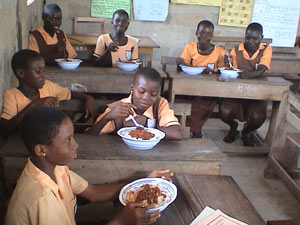 The World Food Programme (WFP) says it has signed an agreement with a Chinese company, HNA Group to provide school meals for children in Ghana. The deal is worth $1.6 million.
The World Food Programme (WFP) says it has signed an agreement with a Chinese company, HNA Group to provide school meals for children in Ghana. The deal is worth $1.6 million.
According to the UN agency, the new partnership with HNA Group is to fight hunger globally.
The WFP says the funds will help it provide take-home rations to promote girls’ education under its school meals programme in Ghana.
During the signing of the agreement in Beijing, May 22, 2013, the WFP Executive Director, Ertharin Cousin said, “As a country that has so successfully brought millions of its own people out of poverty, China is perfectly positioned to take a leading role in the global fight against hunger,” adding, “We welcome the efforts of HNA Group to invest in the future of Ghanaian children, and we hope their support will serve as an inspiration for others.”
The WFP indicated that HNA’s support to its school meals programme in Ghana is planned as the first stage of an ongoing collaboration. The group has also expressed its interest in helping similar projects in other African countries as well as raising additional funds from its corporate partners, investors, customers and employees.
According to the WFP, over 66 million children of primary school age go to class hungry around the world.
“It costs on average only $0.25 per day to feed a child in school through WFP. The HNA Group’s donation will help nearly 3,900 girls in Ghana attend and stay in school for five years,” it said.
The WFP added that it provides school meals to more than 22 million primary school children in over 60 countries around the world, including to 180,000 children in Ghana.
“School meals encourage parents to send their children to school and help students concentrate better in class. Take-home rations for girls, which feed the whole family, act as an extra incentive for parents to send their daughters to school,” it said.
Ertharin Cousin signed for the WFP and HNA Group Chairman, Chen Feng signed for his company.
The government initiated the Ghana School Feeding Programme (GSFP) in 2005, in collaboration with the Dutch government under the Comprehensive African Agriculture Development Programme (CAADP) Pillar 3 of NEPAD and the recommendations of the UN Millennium Task Force on Hunger.
Its long term goal is aimed at contributing to reducing poverty and enhancing food security in Ghana. It also seeks to boost domestic food production, increase school enrolment, attendance and retention among kindergarten and primary school children.
The programme also aims to reduce hunger and malnutrition, and that way contribute to the achievement of the Millennium Development Goals.
The strategy as stated by the Ghana government is to provide meals daily, on school days, to children in public kindergarten and primary schools.
ghanabusinessnews.com























